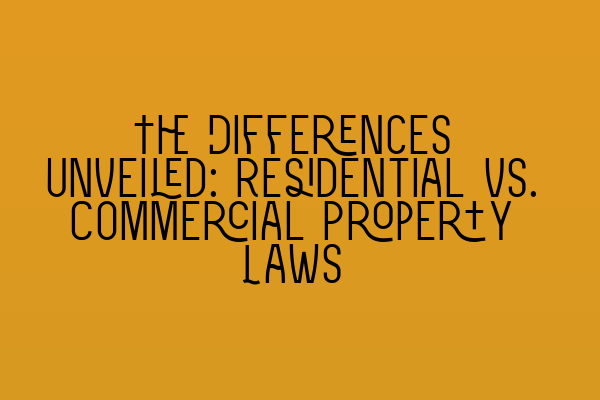Residential and commercial properties are two distinct types of real estate that require different legal frameworks and regulations. As a property owner or investor, it is essential to understand the differences between residential and commercial property laws to ensure compliance and make informed decisions. In this blog post, we will unveil the disparities between residential and commercial property laws, highlighting key aspects and factors that every property owner should know.
Before diving into the specifics, it is crucial to clarify what residential and commercial properties entail. Residential properties refer to spaces primarily used for accommodation purposes, such as single-family homes, condominiums, apartments, and townhouses. On the other hand, commercial properties are intended for business or income-generating activities, including retail stores, office spaces, industrial buildings, and warehouses.
1. Ownership and Tenancy:
One of the primary differences between residential and commercial property laws lies in ownership and tenancy. Residential properties are usually owned by individuals or families who live in or rent out the spaces for residential purposes. In contrast, commercial properties are owned by businesses or investors who lease the spaces to other businesses for commercial use.
The tenancy agreements for residential and commercial properties also differ significantly. For residential properties, the tenancy agreements are typically governed by residential tenancy laws that protect the rights of both tenants and landlords. These laws outline rules regarding rent increases, security deposits, eviction procedures, and the responsibilities of both parties.
On the other hand, commercial tenancy agreements are subject to commercial lease agreements, which are typically more complex and grant businesses more flexibility in negotiating terms. Commercial leases often involve longer terms, extensive negotiation, and provisions related to rental increases based on business performance or market conditions.
2. Contractual Obligations:
Residential and commercial properties have different contractual obligations and legal considerations. In residential property transactions, the buying or selling process usually involves a straightforward purchase agreement and the transfer of ownership. These transactions are regulated by local property laws and generally follow a standardized process.
Commercial property transactions, on the other hand, are often more intricate and involve additional legal considerations. Due diligence plays a crucial role in commercial property transactions to assess the property’s value, potential income, and implications for the buyer’s business. Purchase agreements for commercial properties may include clauses related to zoning restrictions, environmental compliance, permits, and licenses.
3. Planning and Zoning:
Another significant difference between residential and commercial property laws is related to planning and zoning regulations. These set of laws establish how land can be used and what types of structures can be built on a particular piece of real estate. Planning and zoning regulations help maintain order and balance between residential areas and business districts.
Residential properties are typically located in areas designated for residential use. Zoning regulations for residential areas often focus on ensuring the quality of life for residents, promoting community amenities, and preserving the character of the neighborhood. These regulations may limit or restrict certain types of businesses from operating in residential zones to preserve the peaceful and residential nature of the area.
Commercial properties, on the other hand, are located in areas specifically designated for business activities. Zoning regulations for commercial areas aim to create business-friendly environments, attract investment, and foster economic growth. These regulations provide guidelines regarding building size, signage, parking facilities, and permissible business activities.
4. Lease Terms and Negotiations:
Lease terms and negotiations also differ significantly between residential and commercial properties. Residential leases are often based on standard lease agreements, and the terms are relatively straightforward. Rent is typically paid on a monthly basis, and lease durations are often shorter, ranging from six months to one year. Residential leases also offer greater tenant protections, such as the right to privacy and freedom from discrimination.
Commercial leases, on the other hand, involve more complex negotiations and longer lease terms. Lease durations for commercial properties can vary from three to ten years or more, depending on the type of business and the landlord’s preferences. Commercial leases may also include provisions regarding rental adjustments, common area maintenance fees, shared expenses, and other business-specific considerations.
Conclusion:
Understanding the differences between residential and commercial property laws is essential for property owners, investors, and professionals operating in the real estate industry. The legal frameworks surrounding these property types dictate various aspects, including ownership, tenancy, contractual obligations, planning, zoning, and lease terms. By familiarizing yourself with these distinctions, you can make informed decisions, ensure compliance with relevant regulations, and protect your interests.
If you are preparing for the SQE exams and want to test your knowledge of property law, check out our SQE 1 Practice Exam Questions and SQE 1 Practice Mocks FLK1 FLK2 articles. We also offer SQE 1 and SQE 2 Preparation Courses to help you excel in your exams. Stay updated about upcoming SRA SQE Exam Dates to plan your preparation effectively.
Please feel free to reach out to SQE Property Law & Land Law for expert advice and assistance regarding residential and commercial property laws. Our team of experienced solicitors is dedicated to providing comprehensive and professional legal services tailored to your needs.
